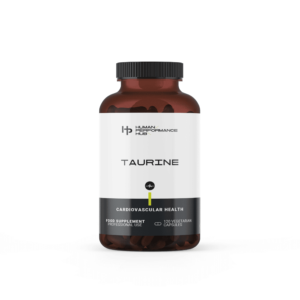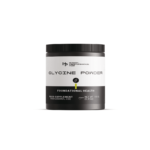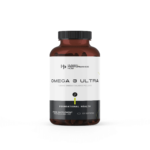Taurine (2-aminoethanesulfonic acid) is an organic compound widely found in the human body. It is considered a conditional amino acid because it can be manufactured by the body. Taurine is essential for cardiovascular function, development of skeletal muscle, retinal function and the nervous system. One area that people tend to neglect are the benefits that taurine has on sleep. In this article, Human Performance Hub explores whether you should take taurine before bed and how it can impact sleep quality.
So, should I take taurine before bed? Whilst it is completely up to personal preference, taurine can be taken before bed to help you fall asleep more easily. This is because taurine helps lower cortisol levels, the stress hormones in the body. It also helps regulate the body’s production of melatonin, the chemical that signals to your brain when it should be feeling sleepy.
Keep reading to learn more about taurine’s impact on sleep and where to find any important information about this organic compound.
Can I Take Taurine Before Bed?
Yes. Early research shows that taurine, especially if combined with other ingredients, can act as a natural sedative to calm anxiety and lessen reactivity to stress, therefore allowing you to sleep more easily at bedtime. Taurine is a naturally-occurring compound found in the body that increases in response to prolonged periods of being awake. It activates GABA (A) receptors in the brain region known to regulate sleep and is also involved in the creation of the ‘sleep hormone’ melatonin, in the pineal gland.
Does Taurine Help You Sleep?
Martin Seeley, the CEO and sleep expert at Mattress Next Day, reported to The Mirror that taurine helps regulate a person’s sleep-wake cycle because it helps lower cortisol levels, otherwise known as the stress hormone, in the body. This means that taurine can promote restorative sleep more quickly because it stops you from feeling stressed before bed. He states that:
“Whilst there’s still a lot of research that needs to be conducted to better understand taurine’s positive impact on sleep, it’s believed that taurine helps lower a person’s cortisol levels. As many studies show that stress can have a significant impact on how long it takes a person to fall asleep, taurine can, therefore, promote restorative sleep more quickly.“
Martin also added that taurine helps regulate the body’s production and release of melatonin, the chemical that signals to your brain when it should be feeling sleepy and when it should feel more awake.
Sources of Taurine
Taurine is a naturally-occurring substance mainly found in:
- Fish (Scallops, tuna, octopus)
- Meat (Beef, chicken, turkey)
- Dairy products
In addition to getting taurine from food, you can also get it from some energy drinks and supplements.
Myths and Misconceptions Surrounding Taurine
More often than not, people have never heard of the organic compound taurine; however, if you have heard of it, there is a good chance you will have come across some bizarre theories. Let’s dismantle some of these common misconceptions:
Let’s start with the word taurine. Whilst its name is derived from the zodiac name for bull, ‘Taurus’, it’s important to remember that taurine does not come from any part of the bull, in particular, bull’s urine or semen.
Fun fact – Historically, taurine was first isolated in 1827 from ox bile, which may help to explain its name and the enduring “made from bulls” myths.
While many are aware of taurine’s ability to stimulate muscle growth and improve athletic performance, taurine actually promotes many more health benefits that are often neglected. Taurine has a number of other advantages, including its ability to provide relaxing sedative effects that help you fall asleep naturally.
Further Health Benefits of Taurine
Clinical studies have shown that supplemental taurine has many verifiable benefits, these include:
- Improves athletic performance, increasing endurance and strength
- May reduce the risk of cardiovascular disease by reducing blood pressure and inflammation
- May help to increase the growth of brain cells (can decrease the side effects of Parkinson’s disease)
- May help to treat metabolic syndrome. Researchers have found that taurine reduces triglycerides to prevent obesity, improves insulin resistance to regulate the metabolism of glucose, lowers cholesterol and reduces blood pressure.
- Taurine is an antioxidant, which means it can help prevent inflammation. Studies have shown it can actually help to heal periodontal disease.
- It can help prevent congestive heart failure and liver disease (hepatitis)
- In diabetics, taurine can improve blood sugar control.
Is It Safe To Take Taurine as a Supplement?
Yes. Taurine is completely safe to take as a supplement and has many benefits. Research studies have not identified any common side effects to date, however, bear in mind that there is not sufficient evidence to support the idea that taurine is the ‘best supplement for promoting sleep’.
Industry experts use their customers to vouch for taurine’s effectiveness as a sleep aid. According to them, 98% would recommend taurine to a friend, 97% reported that they slept better, 77% report that they were able to fall asleep faster and 78% reported that after trailing taurine, they woke up less frequently throughout the night.
Is It Safe To Take Taurine Everyday?
Yes. According to the best available evidence, taurine has no negative side effects when supplemented appropriately.
One 2019 report suggests that the highest daily dose of taurine you can safely consume is 3 grams per day. However, the European Food Safety Authority (EFSA) suggested in its 2012 guidelines that you can safely take up to 6 grams per day
HPH Taurine Recovery & Sleep Support
Taurine Supplements At Human Performance Hub
Now that you are aware of the many benefits of taking taurine, why not take a look at our taurine supplements at the Human Performance Hub.
If you are looking to improve the quality of your sleep, taurine supplements are a great way to help with recovery and sleep by downregulating the nervous system.
Take a look at our range online today, or get in touch with us for tailored advice.




